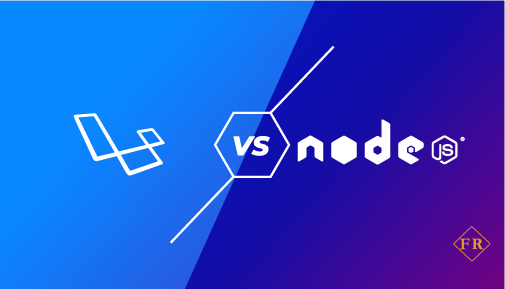Laravel vs. NodeJS: A Detailed Comparative Analysis
-

Ashok Kumar Singh CEO
- Trending Tech
Table of Contents
- Performance
- Scalability
- Easy and Effortless Testing
- Structure and Flexibility
- Learning Curve
- Customization
- Security
- Ecosystem
- Development Speed
- Convenience in Hiring Developers
Performance
Performance is incredibly important to consider while developing web applications. The performance of the Laravel web development framework is comparatively slow. A close look at the comparison table of the features of both web development frameworks will help you comprehend remarkably. However, it can be improved if optimised efficiently. Also, the cache tags of Laravel enable applications to load pre-stored data, which leads to quick response time and efficient performance.
On the contrary, NodeJS is a remarkable choice as it is asynchronous. It doesn't stop the operations and works simultaneously on countless requests. This helps in the reduction of response time and leads to quicker outcomes.

Scalability
It is incredibly crucial to select the right framework when creating web applications. So, always opt for a web application framework that has high scalability.
The apps that are developed on Laravel are scaling up their applications gradually. Laravel receives its scalability from PHP. It can also accomplish huge horizontal scaling by utilising the right database and load balancer.
The applications of NodeJS are usually scalable due to their event-driven models and non-blocking I/O that can accommodate countless requests. Its event loop mechanism helps the server to tackle an array of requests. Furthermore, its compatibility with microservices works remarkably by categorising the applications into smaller components.
Easy and Effortless Testing
Laravel offers different testing tools and exceptional resources to ensure its web applications are up and running smoothly. With the aid of these tools, a developer gets aid to develop bug-free applications. Laravel also comprises well-structured testing documentation designed for its testing tools and methodologies.
On the contrary, NodeJS has a different approach to testing. It offers a soundproof testing ecosystem for applications. Furthermore, it provides automated testing features with incredible tools like Jest, Code, Mocha, Ava, Lab, and Jasmine.
Structure and Flexibility
The efficiency of a web application hugely depends on the platform's structure. Laravel is a PHP-based framework that categorises business logic and presentation to boost performance. The controller functions to develop a bridge to tackle all the requests and connect the model to retrieve assimilated information. It also transmits information to views.
On the other hand, NodeJS is a single-threaded event loop design that differs hugely from the response and request techniques using multiple threads. It sends blocking and non-blocking requests to the platform. Further, NodeJS also serves and returns a response for single requests without external authorisation.
Learning Curve
Developers require having profound knowledge of PHP framework, CSS, and HTML to master Laravel. Laravel also becomes easy to execute as it comes adorned with fantastic templates and exceptional built-in libraries. But, becoming a Laravel expert needs adequate effort.
On the other hand, developers who have relevant experience in JavaScript can easily master NodeJS. The developers also find it incredibly easy to unlock and comprehend the architecture. Thus, NodeJS wins the game in the learning curve.
Customisation
As it is open-source, the Laravel feature of customisation & integration provides you with functioning code. It allows you to experiment at your heart's content. If you have in-depth knowledge of PHP, you can modify these codes per your app's specifications.
The Node runtime environment is also open source. One can easily customise the packaging modules and manage the dependency version per your development specification. The framework of Node also offers a boilerplate which you can easily modify into a completely functional application and share with others.
Security
In terms of securities, Laravel holds a more towering position than Node. Laravel web development framework offers various security features out of the box, with the inclusion of encryption and hashing functions by utilising Bcrypt Hashing Algorithm, protection against XSS and SQL injection attacks. It also offers support for best security practices like salting and password hashing. It also incorporates unique features like password resetting and email verification that can help secure user accounts.
Undeniably, NodeJS is also secure. However, the security of its applications hugely relies on the code written and the used packages and modules. Further, its event-driven architecture can make it hugely vulnerable to DoS attacks and other attacks that can harm the event loop.
Ecosystem (Support and Community)
PHP holds 79% of the industry when it comes to server-side programming for online applications. With more than 46,231 active users, 64k GitHub Stars, 19,000 threads, and 5k real-time viewers, Laravel has a huge community. The maximum time taken by the community to resolve a Laravel query is 3 days. Additionally, PHP also has a strong community where developers tend to share Laravel news, podcasts, docs, repositories, and the likes.
NodeJS also has a flourishing and well-supported community. As per Stack Overflow, 52% of professional developers use NodeJS for libraries, frameworks, and tools. Amazon, Google, and Facebook have all made considerable contributions to its ecosystem. Furthermore, there are different community forums like NodeJS like Nodebb, Reddit, GitHub, Dev.to, and Stack Overflow.
Development Speed
Laravel's built-in support for templating, routing and ORM can save developers time and effort compared to developing these essential features from scratch. Also, the conventions and abstractions of Laravel help simplify the development process and minimise the time and effort needed to create some features.
On the contrary, NodeJS is devised for creating highly concurrent and real-time applications that strongly focus on scalability and performance. This can make it incredibly fast to create certain kinds of applications like chat applications, real-time dashboards, and streaming services.
Convenience in Hiring Developers
One can find a pool of experienced and skilled professionals due to the popularity of the framework as a PHP framework. It also has a huge community, making it easy to hire proficient Laravel experts who are well-experienced. On average, you can expect to pay between INR 2050- 8200 per hour.
Similarly, one will find a huge pool of skilled professionals, as there is immense popularity and demand for developing scalable and high-performing applications. On average, you can expect to pay NodeJS experts between INR 2500 -12,298 per hour. These rates can vary according to location and experience.
To Conclude…
We hope today's detailed post has helped you look beyond the comparison debate of Laravel vs. Node JS in 2023. Both of these frameworks have exceptional features, and there exists no doubt why they have gained huge popularity over the years.
But the final decision depends more on your requirements. If you want to develop web applications that demand ample backend logic in the MVC model, you should always go for Laravel. Again, if you aim to develop real-time applications, NodeJS is the perfect choice any day. Either way, you can count on both these unique frameworks as viable development choices for the foreseeable future. So, make an informed decision and get started today!
Frequently Asked Questions
To decide effectively between Node JS and Laravel in 2023, it is significant to consider essential factors like project requirements, team expertise, performance needs, ecosystem, scalability, community support, and personal choices. It is crucial to analyse these vital aspects to select the technology that aligns perfectly with your specific requirements.
Usually, Laravel doesn't require any new modules. However, at certain points, the node modules become essential when a developer works with Laravel Mix, Bootstrap, or jQuery.
Both Laravel and NodeJS have the capacity to develop RESTful APIs. Laravel offers a robust routing system, built-in authentication and eloquent ORM, thereby making the process of developing API straightforward.
On the other hand, NodeJS, along with frameworks like NestJS or ExpressJS, provides brilliant performance and flexibility. This makes it a famous choice for developing APIs as well. Finally, the preference depends completely on familiarity with the frameworks and languages involved.
With its event-driven and non-blocking architecture, NodeJS is usually the perfect choice for real-time applications. Its capacity to deal with concurrent connections and unmatched support for WebSockets makes it apt for applications that demand real-time updates. These applications can range from chat applications and live dashboards to collaborative tools.
When used appropriately, both NodeJS and Laravel can deliver brilliant performance. The latter hugely benefits from the optimisations of performances in the PHP ecosystem, while the former is better known for its non-blocking I/O model.
Vital factors like code quality, coaching techniques and server configuration can greatly impact the performance. Hence, it is important to write efficient codes and optimise your applications based on the specific needs and constraints to accomplish optimal performance.
In 2023, countless noteworthy projects and remarkable organisations are making use of both Laravel and NodeJS. Eminent companies like 9GAG, Buffer, and Etsy have adopted Laravel. On the other hand, various trailblazing companies like Netflix, Uber, and LinkedIn are using NodeJS. These instances demonstrate the scalability and capacities of both frameworks in real-world applications.
Our Location




